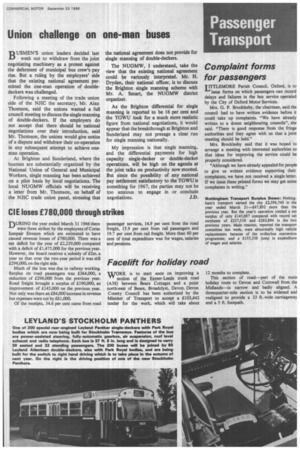Union challenge on one-man buses
Page 75

If you've noticed an error in this article please click here to report it so we can fix it.
BUSMEN'S union leaders decided last week not to withdraw from the joint negotiating machinery as a protest against the deferment of municipal bus crew's pay rise. But a ruling by the employers' side that the existing national agreement permitted the one-man operation of doubledeckers was challenged.
Following a meeting of the trade union side of the NJIC the secretary, Mr. Alan Thomson, said the unions wanted a full council meeting to discuss the single manning of double-deckers. If the employers do not accept that there should be national negotiations over their introduction, said Mr. Thomson, the unions would give notice of a dispute and withdraw their co-operation in any subsequent attempt to achieve oneman operation.
At Brighton and Sunderland, where the busmen are substantially organized by the National Union of General and Municipal Workers, single manning has been achieved on a pilot basis by local negotiations. The local NUGMW officials will be receiving a letter from Mr. Thomson, on behalf of the NJIC trade union panel, stressing that
the national agreement does not provide for single manning of double-deckers.
The NUGMW, I understand, take the view that the existing national agreement could be variously interpreted. Mr. H. Dryden, their national officer, is to discuss the Brighton single manning scheme with Mr. A. Smart, the NUGMW district organizer.
As the Brighton differential for single manning is reported to be 16 per cent and the TGWU look for a much more realistic figure from national negotiations, it would appear that the breakthrough at Brighton and Sunderland may not presage a clear run for single manning nationally.
My impression is that single manning, and the differential payments for high capacity single-decker or double-decker operations, will be high on the agenda at the joint talks on productivity now mooted. But since the possibility of any national pay settlement satisfactory to the TGWU is something for 1967, the parties may not be too anxious to engage in or conclude negotiations.








































































































































































































































































































































































